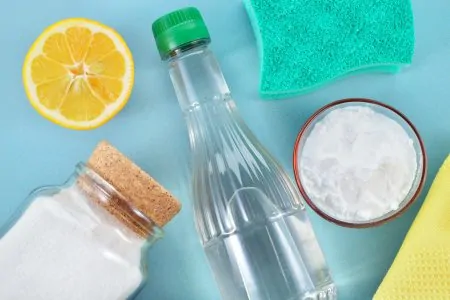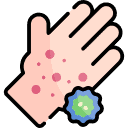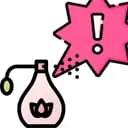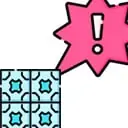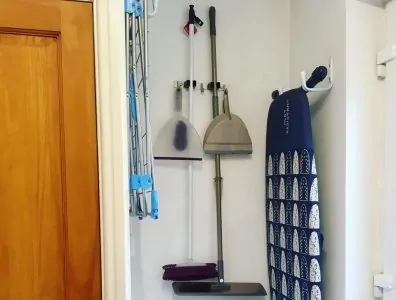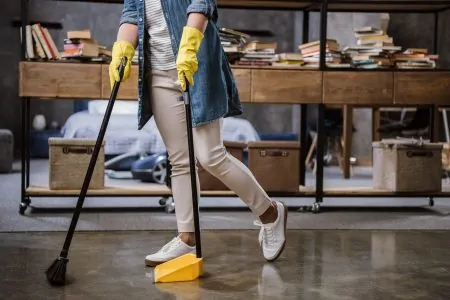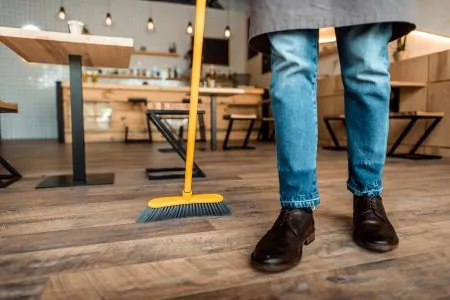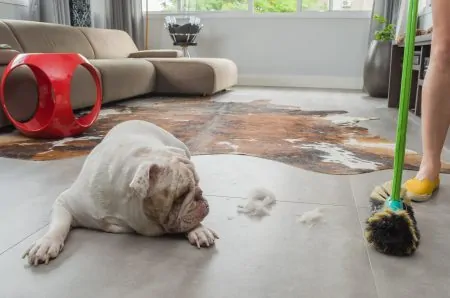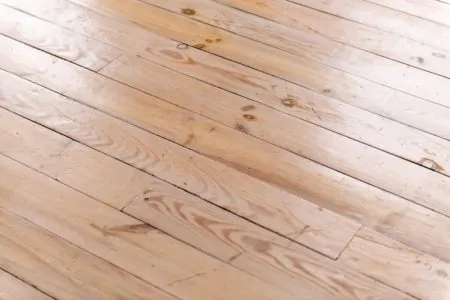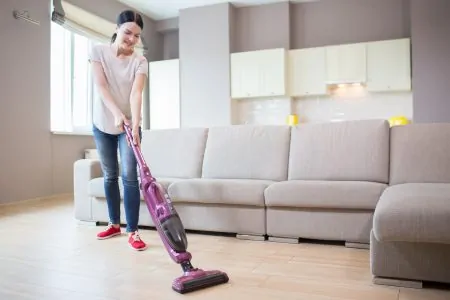A common concern about commercial cleaning products is the uncertainty regarding ingredients and chemicals. Did you know that cleaning companies aren’t even required to list all their ingredients?
Plus, when listed, reading the label can sometimes cause more confusion than clarity.
The good news is that it’s super easy to create your own homemade floor cleaner. Plus, you can use ingredients you already have! This is the best way to ensure your floors are clean without exposing your family to harmful fumes or chemical residue.
Key Takeaways
- Homemade floor cleaners are allergy-friendly, cost-effective, eco-friendly, and safe for children.
- Home Refresher recipe: Mix water, baking soda, white vinegar, and essential oil for an effective cleaner.
- Basic Floor Cleaner recipe: Combine distilled water and vinegar for a simple yet efficient cleaning solution.
- Be cautious with certain floor types and essential oils, as they can cause damage or be toxic to pets.
Why Use Homemade Floor Cleaners?
Homemade floor cleaners are an excellent choice for homeowners on a budget. They’re also a good option for families dealing with various health issues. Additionally, using a homemade cleaner is preferable if you want to keep it eco-friendly.
Here are but a few more benefits of using homemade floor cleaners:
Best Homemade Floor Cleaner Recipes
The benefits of making your own floor cleaner are endless. We tried out a few recipes to ensure they’re worth mentioning. These are some of our favorite options.
1. Home Refresher
If you want to clean and deodorize your house, you need a solution that’s powerful enough to cut through grime while adding freshness.
Here’s what you need:
- Four ounces of water
- A quarter cup of baking soda
- Four ounces of distilled white vinegar
- Five drops of essential oil
- Mix the Ingredients: Combine the water and baking soda in a spray bottle, mixing it well. Then add the vinegar. There will be a fizzing reaction when vinegar and baking soda meet — don’t worry, it’s normal. Finish off by adding a few drops of essential oil and give one last shake.
- Spray and Mop: For this recipe to be most effective, we recommend using a microfiber pad. Spritz as you go and wipe with the mop. Remember, spray and wipe the area immediately if you’re cleaning hardwood.
- Rinse: Fill another spray bottle with clean water and use the same method to rinse the floor. This will eliminate any potential residue and help to add shine.
2. Basic Floor Cleaner
This is an excellent cleaner if you’re in a hurry. This basic cleaner consists of distilled water and vinegar — it’s one of our favorite tile cleaners.
Here’s what you need:
- One gallon of distilled water
- Four ounces of vinegar
- Combine the Ingredients: Mix the distilled water and vinegar in a bucket. Give it a nice stir to ensure it’s well combined. You can also add a few drops of essential oil, such as lemon or tea tree.
- Mop the Floor: Dip the mop in the solution and wring out the excess. Mop the floor in sections, dipping and wringing the mop as you go. Allow the floor to dry.
3. Natural Power Cleaner
When we clean our floors, we want to use something that will cut through dirt and grime effortlessly. This next recipe will do just that on multiple surfaces in the home.
Here’s what you need:
- One teaspoon of castile soap
- Four cups of warm water
- 5–10 drops of essential oil
- Combine the Ingredients: Mix the water, castile soap, and essential oil in a spray bottle and give it a good shake.
- Test: Give the solution a quick safety test in an inconspicuous area to ensure it won’t damage your floors. This is especially important if you have hardwood floors. Castile soap can cause minor damage to the finish.
- Use a Microfiber Mop: Microfiber mops are soft and gentle yet effective at reaching tiny crevices and corners. Spray the floor as you go and wipe back and forth. Then use a clean cloth or towel to dry.
4. Bug Repellent Floor Cleaner
During the warmer months of the year, bugs and pests are everywhere to be found. Someone might’ve spilled something, and before you know it, an army of ants has claimed the area. Before you run to get the insecticides, try this homemade cleaner:
- One gallon of hot water
- Two ounces of dish soap
- Two ounces of castile soap
- Four drops of pine essential oil
- Four drops of lavender essential oil
- Four drops of peppermint essential oil
- Four drops of orange essential oil
- Two drops of lemongrass essential oil
- Two drops of tea tree essential oil
- Two drops of cedarwood essential oil
- Mix: Combine all ingredients, except the hot water, in a bucket and stir well to mix. If you have wooden floors, replace the dish soap with a wood-safe product such as Murphy’s Oil Soap. After mixing the oils and soaps well, pour in the hot water to ensure everything is thoroughly combined.
- Mop: Dip the mop in the bucket and wring out the excess. Wipe the floor, starting at the farthest part of the room. The essential oils will repel insects and pests. Moreover, the fragrant combination of oils will give your home a fresh scent.
- Buff: Use a dry cloth to buff the floor. This is particularly effective if you have wooden floors; buffing will restore shine while removing excess oil.
5. Disinfectant Floor Cleaner
For many homeowners, disinfecting their floors consists of products like chlorine bleach or ammonia. However, we have an alternative.
Here’s what you need:
- Two cups of warm water
- Four ounces of distilled white vinegar
- Two ounces of isopropyl rubbing alcohol
- Two squirts of liquid dish soap
- Five drops of essential oil
- Combine the Ingredients: Mix this recipe in a spray bottle or a bucket (you may need to increase the ingredients to suit the bucket).
- Spray and Mop: Spritz before you and wipe with a microfiber mop as you go. If you’re using a regular tangle mop, wring it until damp. There’s no need to rinse the floor after using this cleaner — simply allow it to dry.
6. Natural Stone Basic Cleaner
Natural stone flooring is tricky to maintain. Most stones are highly porous and will absorb excess liquids left behind. Unfortunately, stone cleaners aren’t cheap — so here’s our alternative:
- 2–3 squirts of mild dish soap
- Half a gallon of water
- Make the Solution: Start by filling a bucket with half a gallon of water. Add the dish soap and mix it thoroughly until it starts to bubble.
- Mop and Rinse: Dip the mop in the bucket and wring out the excess, leaving it damp. Sweep the floors using overlapping strokes. Once you’re done, rinse the floor with clean water to avoid soap residue.
Homemade Carpet Stain Removers
Stains on a carpet can be frustrating to remove. Acting fast can save you time and effort. But before you reach for the commercial product, here are a few homemade recipes to try:
1. Shaving Cream
Begin by blotting out the spill as much as possible with a wet sponge or cloth, starting at the edges to not spread the liquid.
Squirt a bit of shaving cream onto the stain. Leave it for a couple of minutes, then rub it off using a damp sponge.
Shaving cream is particularly effective on cream or beige-colored carpets and rugs. It won’t discolor or cause any damage to the fibers.
2. Hydrogen Peroxide
If you’re a parent or pet owner, you might have seen your fair share of mystery stains. How do you remove it when you don’t know what caused it?
A simple mixture of one teaspoon of three percent hydrogen peroxide and a small spot of non-gel toothpaste should do the job.
Combine the two to create a paste and apply it to the stain. Rub lightly using a sponge or cloth and then rinse with clean water — the stain should be gone.
3. Baking Soda
One of our favorite natural carpet stain removers is baking soda. It’s easy to use, always on hand, and effective. If there’s vomit, urine, or foul odors on your carpet, grab a box of sodium bicarbonate.
Always start by blotting up excess fluids from the stain. You can create a paste using equal amounts of baking soda and water. Apply to the stain and rub with a small brush or sponge.
You can also sprinkle a generous amount of baking soda on a wet stain to absorb the fluids. Then leave it until the powder forms a small crust, and vacuum.
If you need to deodorize the carpet, you can mix baking soda with essential oils. Spread a small amount on the whole carpet and leave it for up to four hours. Vacuum the carpet thoroughly to remove excess powder (8).
Store-Bought Natural Floor Cleaners
If you want to use a natural floor cleaner but don’t want to make it yourself, there are plenty of options. However, it’s still essential that you consider what type of flooring you have, as some ingredients can damage certain floors. You should never clean natural stone with acidic products, even natural ones.
Here are a few of our favorite store-bought natural floor cleaners:
1. Natural All-Purpose Cleaner by TriNova
This all-purpose cleaner is all you need to clean your home green-style. It’s all-natural and uses a blend of essential oils to add a fresh scent. Many parents prefer to use this as it’s safe around children and pets.
You can use the product around the house to clean kitchen surfaces, bathrooms, floors, and toys. There’s no need for rinsing as this won’t streak.
2. Multi-Surface Cleaner by Puracy
This effective multi-purpose cleaner can remove grease, food, soda, juice, sugar, urine, and many more spots and stains. This safe formula was developed by doctors and contains no toxins or harsh chemicals.
The formula is hypoallergenic and plant-based, making it safe to use around children and pets.
We like that this cleaner is safe for any floor type — including natural stone surfaces.
3. Naturally Dirt-Destroying Cleaner by Better Life
Better Life is a brand that uses only sustainable packaging, solar energy, recyclable materials, and biodegradable formulas.
This product is an effective floor cleaner that’s safe for hardwood, bamboo, tiles, marble, laminate, vinyl, and more. Plus, no need to rinse.
The formula works effectively by cutting through grime. The cherry on top? It adds a fresh scent to the house as you clean.
If you’re concerned about your natural stone floors, Better Life has also created a Granite and Stone cleaner. This is safe to use on all-natural stone and helps restore shine while removing dirt and grime.
FAQs
DIY-Haven
Making your own homemade floor cleaner is as simple as one, two, three.
Before deciding on a recipe to try, make sure it will be safe for your floors. If you have tiles, nearly all homemade recipes are reliable. However, natural stone-owners should be wary of acidic products such as vinegar and lemon juice.
Always start with a small test in an inconspicuous area. Apply the cleaner and use it as recommended. Once finished, look for any signs of damage, such as discoloration. If you notice anything, discard it and try another.
